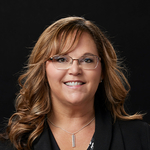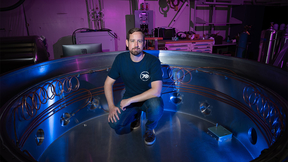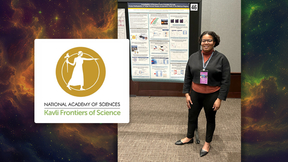Q&A with Neda Gray: Celebrating Black History Month and STEM
 (Download Image)
In honor of Black History Month, Livermore Laboratory employee Neda Gray shares her background and perspective on engaging underrepresented groups in science, technology, engineering and mathematics (STEM) education.
(Download Image)
In honor of Black History Month, Livermore Laboratory employee Neda Gray shares her background and perspective on engaging underrepresented groups in science, technology, engineering and mathematics (STEM) education.
__________
As a champion for the Department of Energy's Minorities in Energy Initiative, Tony Baylis, director of the Office of Strategic Diversity Programs, is aiding the initiative by calling attention to the critical need for greater diversity in STEM professions and education.
Key individuals will be featured throughout the month of February in a Q&A series with the overarching theme "Supporting Diversity in the Sciences and in STEM Education."
The final Q&A in the series features Neda Gray. Gray has worked at LLNL since 1989. She is the Information Systems Security officer for the Operations and Business (O&B) principal associate directorate and the HIPAA security officer for LLNL. She ensures O&B adheres to computer security policies and procedures and maintains the safety, integrity, and availability of data. Gray is responsible for managing valuable, sensitive data including financial, personnel, infrastructure operations, business and health care information. Protecting the privacy and authenticity of this data is of paramount importance.
Q&A with Neda Gray:
Q: Why did you choose to work at LLNL?
A: After working in private industry for a number of years, I wanted to move into an environment that fosters new ideas and advanced technologies. The Lab offers an environment of infinite learning and ever-present challenges that require skill sets relevant to solving IT problems common across many industries in our nation. At LLNL, I feel that we are attacking issues that plague the IT industry as a whole, and little by little we are making the world of electronic communication safer and more efficient.
Q: What is your educational background?
A: My undergraduate degree is in mathematics and computer science from Grambling State University in Louisiana.
My graduate degree is in business administration with a concentration in computer information systems from California State University, East Bay.
I also hold the following certifications: Certified Information Systems Security Professional (CISSP) and Certified Information Security Manager (CISM).
Q: What inspired you to work in a STEM area?
A: I've always had a love for mathematics. I suppose it was an easy subject for me in school, but for me it simply made sense logically. Math is predictable, repeatable and absolute. Who can ask for more?
Q: What excites you about your work at LLNL?
A: Computer security is never boring -- never, ever boring. There are always areas where improvements can be made. There are always articles in the news concerning identity theft or hacker intrusions or new computer threats. It's better than the best mystery novel.
Q: What is the most helpful tip or insight that anyone has given you about working at the Lab?
A:"Genius is all well and good, but motivation and desire above all else are paramount for success. All of us know extremely intelligent people who never succeed. Few of us know extremely motivated individuals who don't."
- John Kenneth Galbraith
Q: How can our country engage more underrepresented groups in STEM?
A: In order to make a significant impact on American society, we must address the mindset and value system of the adult population. If we can convince mothers and fathers to instill in their children a sense of value for education, responsibility for actions and decisions, love for others (not only family members) and spiritual enlightenment, we can begin to change the world.
Q: What do you like to do in your spare time? What are your hobbies?
A: I love playing tennis. I haven't had as much time to devote to improving my game as I'd like, but I can see myself playing tennis at the ripe old age of 90.
_______________
To view additional articles in this Q&A series, visit the Web:Kevin Griffin,Dwight Squire and Marcus Worsely.
Contact
 Carrie L Martin
Carrie L Martin
[email protected]
(925) 424-4715
Related Links
STEM educationBlack History Timeline
Tags
Academic EngagementSTEM
Science
Featured Articles







